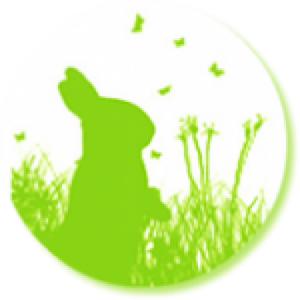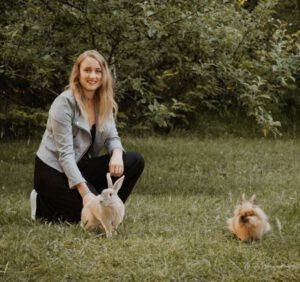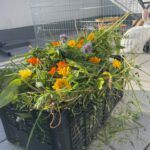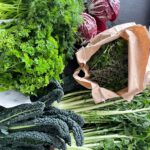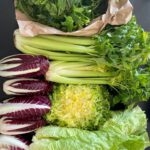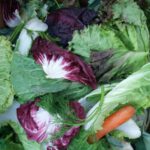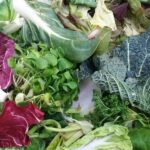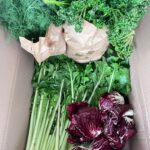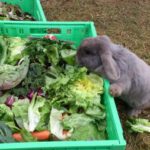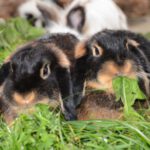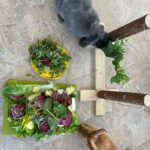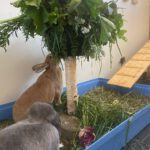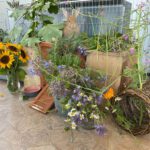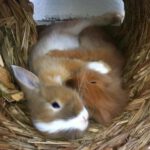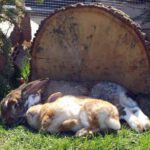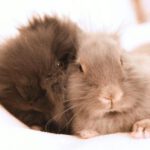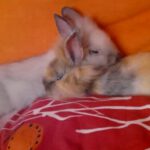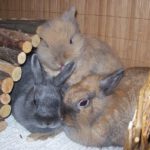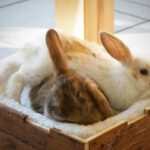Contents
- 1. Rabbits are fed with dry food from a pet shop
- 2. Hay as main part of the diet
- 3. Bunnies are fed with crunchers and treats
- 4. Rabbits are fed with hay and 2 small portions of vegetables a day
- 5. No wet herbage is fed
- 5. No wet herbage is fed
- 6. Drinking water is provided from a bottle
- 7. Fresh herbage isn’t provided around the clock
- 8. Rabbits are fed on a mainly dry diet (hay and other dried food…)
- 9. Rabbits are put on a dry diet for fear of diarrhoea
- 10. Feeding of many ‚treats‘
- 11. Nothing is picked from nature
1. Rabbits are fed with dry food from a pet shop
Even if rabbits are fed with only little amounts of a dry food, it may make the digestive system more susceptible for illnesses, it may slow down the metabolism and it can lead to indigestion, intolerances of fresh food and diseases of the teeth.
Replace dry food with healthy food, e.g. JR Farm grainless herbs from the pet shop or another food with a full declaration and that doesn’t contain any by-products. Ideally it consists of many herbs, a few seeds and maybe a little bit of dried vegetables.
Entirely unsuitable are dry foods with pressed or baked ingredients, like pellets, rings or nuggets. If you wish, you may mix your own appropriate food.
2. Hay as main part of the diet
Although hay as main part of the diet of a rabbit used to be popular for a long time – and this approach is still supported by studied vets and vets who received advanced training, we can’t recommend this sort of diet due to various own experiences. Although rabbits fed on a hay rich diet often show a steady digestion as the diet is consistent and continuous (hardly or no changes of food from fresh to dry), more frequent urinary tract infections do incur in these rabbits (due to the low water content of hay and the fact that a natural rabbits diet is based on fresh plants). Furthermore the supply of Vitamin E and ß-carotene is less satisfactory (Vitamin E and ß-carotene deficiencies) and rabbits show a slower metabolism, so that again they are more prone to get digestive problems .
3. Bunnies are fed with crunchers and treats
Most treats from pet shops are unfortunately injurious to the health of our pet rabbits. Whether they are crunchers, crackers, crips or yoghurt drops – all these treats contain ingredients that are harmful to the health of the rabbit (e.g. sugar, honey, milk, eggs, flour, by-products of various origin…). Moreover are these treats not necessary at all, as rabbits are very happy about a healthy treat just as well. Try these healthy treats instead: pea flakes, oat flakes, fresh herbs (e.g. dill), and banana or similar.
4. Rabbits are fed with hay and 2 small portions of vegetables a day
Such a diet strains the digestion very unbalanced. Fresh food is much faster digested than dry food (hay) as this slows down the digestion. The constant change from fresh to dry leads to irritations in the digestive system: e.g. bloated or overloaded stomachs, gobbling of food etc. Additionally the diet may be unbalanced if only a small amount of vegetables (and less varied) is fed.
5. No wet herbage is fed
Rabbits which are used to fresh food also tolerate wet herbage very well. It doesn’t make a difference for the digestion if rabbits additionally drink fresh water to their fresh food or if they feed on wet grass. The only difference that has to be noted is that during prolonged storage of wet herbage the food will be pressed and especially in combination with sunshine it will decay much quicker and could then cause digestive problems.
5. No wet herbage is fed
Rabbits which are used to fresh food also tolerate wet herbage very well. It doesn’t make a difference for the digestion if rabbits additionally drink fresh water to their fresh food or if they feed on wet grass. The only difference that has to be noted is that during prolonged storage of wet herbage the food will be pressed and especially in combination with sunshine it will decay much quicker and could then cause digestive problems.
6. Drinking water is provided from a bottle
Studies have shown that rabbits drink much more if water is provided from a bowl rather than a bottle. Hence it is very important to provide water from a bowl. Why don’t you try yourself to quench your thirst after exercising by drinking from a ball bearing bottle? It will be difficult to succeed as these bottles only provide little drops. Little water intake may lead to urinary tract diseases in rabbits with a predisposition. Place the bowl in a slightly raised position (roof of a hideaway, area without bedding), so it doesn’t get dirty from the bedding. Use a heavy earthenware bowl with the rim curved inwards to prevent it being thrown around. Also suitable are bolt or hook on stainless steel bowls.
7. Fresh herbage isn’t provided around the clock
Rabbits naturally feed on fresh herbage and need a consistent, varied selection of fresh food. In summer the main part may originate from meadows; in winter provide green vegetables (all varieties of cabbage, carrot green, stem turnip, celery stalks, spinach…), twigs etc complemented with oilseeds, hay and dried herbs. Discontinuity of feeding fresh herbage (when hay is consumed increasingly) may result in an irregular load of the digestive system and hence may cause digestive problems.
8. Rabbits are fed on a mainly dry diet (hay and other dried food…)
The digestive system of our pet rabbits is like the one of their wild relatives not made for dried food only. A diet rich in dried food can cause urinary tract diseases and digestive problems in our pet rabbits (due to the slow metabolism as a result of a diet rich in dried food). Many dried foods swell in the stomach and overload excessively the gastric walls.
9. Rabbits are put on a dry diet for fear of diarrhoea
A rabbit that receives a diet that is appropriate for their species and still develops diarrhoea is ill. Pet rabbits have the same digestive system than wild rabbits and it is totally unnatural if they suffer from digestive problems if fed with fresh herbage. Often the digestive system is already pre-damaged from a previous malnutrition (a diet rich in dry food) and has to convalesce or the diet change has happened too fast. In this case it is very important to clarify underlying causes before considering reverting back to a diet rich in dry food.
10. Feeding of many ‚treats‘
Many pet owners mean only well for their rabbits and offer many ‚allegedly healthy‘ treats, such as pea flakes, nuts, dried vegetables, oat flakes or dried fruits. In small amounts (e.g. every 2 days 3 pea flakes or twice a month a piece of apple) this is unproblematic. However, if rabbits are fed with these treats regularly or even in larger amounts (then even once), this may lead to bloated stomachs or yeast infestations. These treats need to stay ‚treats‘ and shouldn’t be fed in excess.
11. Nothing is picked from nature
To stay healthy, rabbits require herbage from outside; even contamination through dog poo, wild animals or car fumes are far less harmful than not to feed any natural fresh herbage at all. Please note: even bought in hay and vegetables harbours these contaminants – this hay and these vegetables have grown on a field too at one point.

